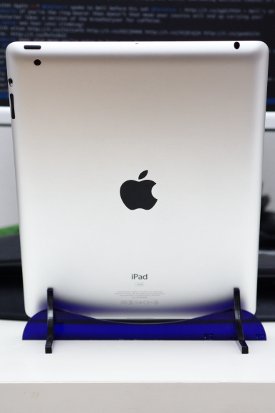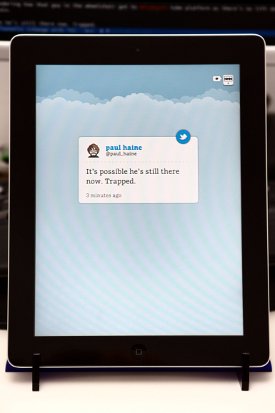Google Reader gets turned off today. It's still working now, but the pop-ups were persistent. I know we're in the last few hours. Despite that I'm nowhere near acceptance; I don't want it to die. It's a new experience: the first time I've lost an online service I loved. I've drifted away from other products & communities over the years, but nothing else was part of my online life until the owners took it out and shot it.
I've used RSS for over a decade but I was a late convert to Reader. I used Opera's built in RSS reader for years, which was... alright. I had some janky unison setup that synced unread items between my desktop and my laptop1. That satisficed for years, but I switched when I could no longer tolerate the lack of feed organisation2. Over the years my habits changed – less reading at a desk on a PC, more on the sofa with my iPad – but Google Reader was the underpinning for all of that.
Reader wasn't an eyecatching product. It wasn't beautiful; it didn't feel fun. You didn't sign up and have your mind blown. But it was reliable, and versatile, and always available. It was a Volvo, not a Porsche. It's breathable air: you don't think about how much you depend on it until it's running out.
The first secret of Reader is that it's a tool – just like a car, or a laptop, or a Leatherman. Everybody used it differently (and some people not at all3). There's no one RSS world. When the shutdown was announced, most friends reacted in one of two ways: they were distraught, or they were incredulous. "Wait," the second group asked. "You guys are still using that? It's 2013! What are you still using RSS for?"
Well, like any tool, a lot of different things. Some people who won't miss Reader used it for discovery – finding new stuff to read. That's a solved problem for many people. Interesting stuff will surface on Facebook, Twitter, Hacker News or Reddit4. But that's not how I use RSS. Some other people use it as a firehose – to follow BBC News, The Guardian, or other big sources that publish multiple times a day5. But that's not me either. Personally, I use RSS as a combination of:
- Post-discovery reading. You get linked to something. It's so good you read 10 other pages, or consume the entire archive. You'd like to read the new stuff in the future, so you add it to your RSS reader.
- Niche updates. I have a thing for newspaper corrections so I'm subscribed to the Guardian's feed. I like reading the blogs of my friends, even though they only update 3 or 4 times a year. Sometimes it's something delightfully weird. They update irregularly and take seconds per post to read.
- Personal alerts. I've got a bunch of saved searches for relevant job adverts in London, eBay items, Kindle special offers, gig alerts, and music recommendations. There's also some social networks I don't log in to, but still get notifications if someone comments on my stuff.
If you're not a completist and follow the right people on Twitter, number 1 might not be a problem for you. But there's a lot of great writing that I only see in my Reader account, and social networks won't help with 2 or 3. Maybe other people use email for that and filter relentlessly; I think that keeping up with 300+ infrequently-updated sources is better suited to RSS6.
The second secret of Reader is that it was the foundation of an ecosystem. I use Reader on my desktop, and Reeder on my phone/iPad. I save links to Pinboard, Instapaper, & occasionally Tumblr. I hoped that the 3 month lead time would be enough for a credible alternative to emerge, but all seem flawed. Reeder for iPad hasn't been updated in months and lacks support for any alternatives; thus two components must change. I have a lot of sympathy for the people working on replacements: as I said, people used Reader in hundreds of different ways. I want a public API, the ability to keep feeds in folders, support for Instapaper, and good keyboard navigation so I can go through a feed of 30 items in 60 seconds7. Other users will have a completely different list. And that's not to dismiss the technical challenge of polling millions of feeds in a timely manner.
I don't know yet what my replacement will be. I'm cautiously optimistic about Digg Reader. Marco went for Feed Wrangler & Mr Reader, which is a strong enough endorsement for me to try it too. Another friend found email to be his replacement, but his love for Reader came from the social features; I barely used those. I'll probably try going cold turkey for a while too, to see what I miss.
Part of me is excited to look back on today. What will future me think of this? Right now, it feels painful, the end of an era. Maybe it will be. Maybe my reading habits will change yet again. Or maybe it'll be no big deal; the switch to some other service will feel seamless. Only time will tell.
-
Yes: this is insane, in retrospect. But it was a different time; having two machines made me a power user. Normal people didn't do that. There was no Dropbox, no iCloud. Wifi was not ubiquitous; smartphones barely existed. And you could hold doubts about free hosted services without seeming like a kook; I mean, what would happen if they decided to turn everything off one day? ↩
-
Opera has folders now. ↩
-
Which is fine, obviously. I'm not trying to convert you to the Church of RSS; I'm just explaining why I liked Reader. ↩
-
And it's probably no coincidence that several of these friends work for a content discovery startup. ↩
-
Those people are crazy. ↩
-
Some people have asked why I need this. The truth is, I don't – in the same way I don't need Twitter, or my iPad, or a latté over my morning code review. But I do like it. It's part of the texture of my life and makes things easier. I don't want to give it up or change it, but I'm forced to. ↩
-
Ideal for photo blogs, one-hit wonder Tumblrs, or just culling a firehose. ↩






